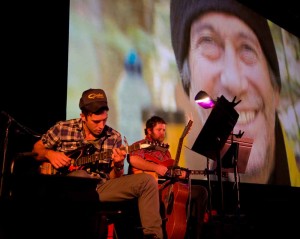Musicians collaborate with filmmaker
A sea of hipsters, dressed in an assortment of flannels and thrift store Christmas sweaters, flocked to the Vista Theatre for the holy trinity of underrated artistic geniuses: indie sensation Sufjan Stevens, alternative-folk artist Raymond Raposa and documentary-filmmaker Kaleo La Belle.

Live duet · Sufjan Stevens (left) and Raymond Raposa joined Kaleo La Belle (not pictured) for a screening and live performance of Beyond This Place Tuesday at Hollywood’s Vista Theatre. - Luciano Nunez | Daily Trojan
The trio came together Tuesday night for a screening of La Belle’s emotive 2010 documentary, Beyond This Place, which investigates La Belle’s relationship, or lack thereof, with his free-spirited father, Cloud Rock. The documentary was accompanied by folk talents Raposa and Stevens live rendition of the film’s subtle yet powerful score.
Coon-skin caps, mismatched vintage styles and nonchalant attitudes could not hide the audience’s excitement; beneath the cool exteriors of this alternative audience existed a riling anticipation, a need for the two empty seats flanking the front of the stage to be taken by Stevens and Raposa and for the burgundy curtains to open and reveal the film.
Calm demeanor and serious artistic attitudes in tow, Stevens and Raposa took their places as accompanists to embark alongside the emotional journey of father and son reconnecting.
What began as a competition between the film and live score vying for the audience’s attention quickly melded into one cohesive experience, allowing the thought-provoking themes of the story and the present, twangy and folk-infused string instruments to enrapture viewers and listeners.
Though the documentary intrigues viewers, it is the film’s music that heightens the experience and reinforces the film’s emotional impact.
As a prime example, psychedelic guitar rifts perfectly accompany nature-infused camera shots and descriptions of being high on mushrooms. Visuals and instrumentals work together as a collective force, enabling the viewer to become mesmerized by the film and forget that the musical duo is even in the room.
For one to forget they were sitting 20 feet away from Sufjan Stevens was a major feat; the artistic medium clearly finds its effective middle ground.
With Stevens and Raposa now part of the film and not some separate and distracting musical entity, Beyond This Place shaped itself as its own noteworthy film. It tackles issues of childhood abandonment and the longing for a drug abusing, hippie father figure to fulfill years of expectations over the course of an extensive biking and camping trip.
In a question and answer session after the screening, La Belle explained his motivation for taking on such a heavy emotional burden, saying, “I approached this project as a filmmaker. I recognized my relationship with my father as a good story.”
But the film’s story is a little more personal than that.
The film delves into the meaning of fatherhood and its expectations.
“Pre-psychedelics, Cloud Rock’s name was Gordon,” La Belle notes. “What would Gordon have been like as a father?”
Moreover, one of Cloud Rock’s friends questions the meaning of genetics and “how much of you is your dad?”
From this, the audience can gather that Beyond This Place is an emotional confession for La Belle, an exploration into the inner psyche of a seemingly oblivious father and the effects of his father’s preference for a free-spirited lifestyle.
La Belle made it clear the film is not meant as a therapy session.
“I always wanted to connect with my father,” La Belle said. “It wasn’t really though until I became a father myself. Right at that moment it was like magic.”
La Belle’s motivations aside, Beyond This Place pulls at heartstrings as it makes viewers question paternal expectations, the bond between father and son and typical conceptions of love. These themes come together full force through the subtleties of the banjo, emotionally driven organ accompaniment and beautifully simple vocals, used only when needed at the beginning and end of the documentary feature.
“What is this f–king love I feel for Cloud Rock?” La Belle bluntly says in the film. “I would love to be angry with him but I’m not.”
We all have a lot to learn from La Belle’s compassion and understanding. The meaning of La Belle’s moral is heightened through the guise of the unique mixture of artistic media in this emotionally striking musical and cinematic event.
